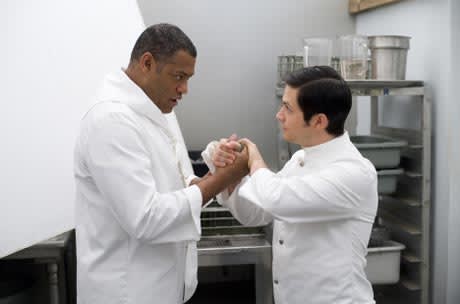More linear than a Robert Altman film, less visually seductive than a Paul Thomas Anderson film, writer/director Emilio Estevezs Bobby Kennedy assassination picture stakes its stylistic ground somewhere between these two masters styles: the long steadicam following shots, the interwoven character arcs and a vast, famous ensemble cast are all accounted for. But where both Altman and Anderson are renowned for their showy technical and artistic flourishes, Estevezs approach privileges the spirit of his subject, Bobby Kennedy, above meta-filmic pretensions. And if hes a lesser director than the abovementioned, the modesty of his artistic faculties is offset by the singularity of his vision. The films major point is to remind liberal democrats how a trio of assassinations (JFK, MLK and Bobby Kennedy) ripped the carpet out from under the U.S. civil rights movement. So, the Ambassador Hotel, the location of Bobbys 1968 assassination, becomes a microcosm of the U.S. at the time: optimistic civil engagement, drugged out hippies, racial tensions, class struggles, early feminism. Each member of Estevezs ensemble (including Laurence Fishburne, Demi Moore, Martin Sheen, Harry Belafonte and William H. Macy) stands in as a representative of a larger whole. We see their hopes grow with Kennedys impending visit and his victory in the California primary, and then witness their devastation at his death. As dramas go, its a "device-heavy piece. What saves it from its contrivances is the clarity of purpose with which Estevez (who wrote and directed the film) approaches his subject. Bobby Kennedy was a big deal. His assassination was a big deal. Every creative decision in the film is designed to drive this point home. That it comes out feeling fresh and vital is this films biggest surprise. The DVDs "making of featurette, "Bobby: The Making of An American Epic, pulls insight from nearly all of the films major players and underscores the prominence the films subject played in every aspect of the creative process, from the films score to its inventive use of archival footage.
(Alliance Atlantis)Bobby
Emilio Estevez

BY Ian MackenziePublished Apr 30, 2007